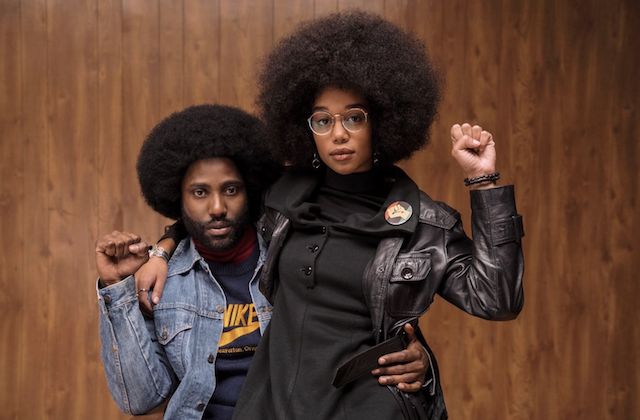This post contains spoilers for "BlacKkKlansman."
On Friday (August 10), as the country revisited the horror of the White supremacist Unite the Right march, director Spike Lee ("Do the Right Thing") and producer Jordan Peele ("Get Out") unleashed the story of the real-life "BlacKkKlansman" on the world.
The title of Lee’s latest narrative feature film refers to lead character Ron Stallworth ("Monsters and Men" actor John David Washington), who was the first Black detective with the Colorado Springs Police Department. By impersonating a White supremacist on the phone and using his White Jewish colleague Flip Zimmerman (Adam Driver, "Girls") as his physical proxy, Stallworth successfully infiltrated a local Ku Klux Klan chapter and prevented violence.
The film uses footage of last year’s violence in Charlottesville and discussions on Black resistance ("Spider-Man: Homecoming" actress Laura Harrier portrays Patrice Dumas, a student activist who dates Stallworth) to explicitly connect this story to the current state of White supremacy in the United States. Its exploration of these themes captivated both critics, who pushed the movie’s Rotten Tomatoes score to 97 percent, and audiences, who contributed to its estimated $10,799,000 domestic opening weekend.
Here’s what some of the journalists covering the film had to say about the project:
"Spike Lee’s ‘BlacKkKlansman’ Tells Epic Story Of America’s Racist Past And Present"
rntBy Danielle Kwateng-Clark, Essence
Stallworth’s place in society as a Black man who works in law enforcement reveals another level of double-consciousness that’s he’s, surprisingly, self-assured about.
“I think he was always for the movement,” Washington, the son of Denzel and Pauletta, told Essence. “I just don’t know if he verbalized it because of his surroundings, because of his environment. He was surrounded basically by a whole bunch of White people. He kind of had to subvert it. He kind of had to hide it.”
"‘BlacKkKlansman’ Scene-Stealer Laura Harrier on Spike Lee and Redefining Strong Female Characters"
rntBy Peggy Truong, Cosmopolitan
"I don’t think we’ve seen the women of that movement represented on screen enough," [Harrier says about portraying Patrice Dumas.] "Usually when we see this, it’s always a very male-driven image of Black Power. I really felt a responsibility to paint them in that light. I also wanted to make [Dumas] relatable and approachable. So much in scripts, you read that she’s ‘a strong woman,’ but what does that really mean? She has strong morals and uses her voice to speak out against injustice, but she has feelings for this man, she’s figuring out those feelings. I wanted her to be a fully rounded person, not just a symbol of something."
"With ‘BlacKkKlansman,’ Spike Lee Brings The Fire This Time"
rntBy Soraya Nadia McDonald, The Undefeated
In "BlacKkKlansman," Lee incorporates the story of the lynching of Jesse Washington, using photos from the day Washington was tortured and murdered by a mob of bloodthirsty White people. Harry Belafonte, playing a revolutionary named Jerome Turner, narrates the sickening tale. Both Lee and Belafonte have spent decades as talented radicals on the fringes of Hollywood, their contributions commended with Governors Awards that bear the sting of Consolation Oscars from an academy that can’t get its act together on race. In "BlacKkKlansman," Lee casts the 91-year-old Belafonte as a highly-regarded elder seated in a wicker chair like the one made famous by Huey Newton. He intersperses Turner’s storytelling with shots of the Klan chapter that Stallworth has infiltrated joyously munching on popcorn as they watch D.W. Griffith’s "The Birth of a Nation."
"‘BlacKkKlansman Doesn’t Let White Women Off The Hook—And It Shouldn’t"
rntBy Katie Rife, The A.V. Club
The White supremacist ideal of the pure White woman, and the dark history of violence and complicity it invokes, is one of many themes explored in Spike Lee’s brilliant pop-political comedy, "BlacKkKlansman," which opened in theaters this weekend…. That ideal becomes flesh in the form of Klan wife Connie Kendrickson (Ashlie Atkinson), a motherly woman in an apron and an updo who’s also one of the most vicious racists in the film. When we first see her, Connie is serving refreshments to her husband, Felix (Jasper Pääkkönen), and his KKK buddies; she’s cheerful and smiling as she passes out drinks and snacks, and the men patronize and condescend to her, telling her to scoot on out of the room so they can talk business. Taken out of context, she might even be rather sympathetic, an eager and intelligent woman consigned to the kitchen because of her sex.
But there is no separating the rigid gender roles in the Kendrickson household from the couple’s equally noxious racial worldview. Before she leaves the room, Connie butts in to let the men know that she heard about an upcoming gathering of the Colorado College Black Student Union led by Patrice Dumas (Laura Harrier), Connie’s opposite in every way but her sex and a fascinating character in her own right. There’s a delight in Connie’s eyes as she reports information she knows could get people killed, and the tone of her voice spouting racial epithets is the same as when she offers “Ron” cookies.
"‘BlacKkKlansman is Not the Film You Expect, It’s the Film You Need”
rn By Jonita Davis, Black Girl Nerds
tt
"BlacKkKlansman" shows that Black people seeking equality and civil rights did not create racism or the current hate leader, Trump. White people who blindly believe films like "The Birth of a Nation" to be true, who fantacize about romping with Rhett and Scarlett on the pre-Civil War plantation—those are the people who gave us Trump. They also spawned White nationalism, weaponized Christianity and hid all the nuances of hate under arguments against housing, food, immigration, unionizing and medical care for the poor.
rnt
